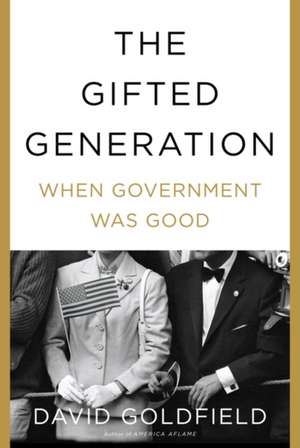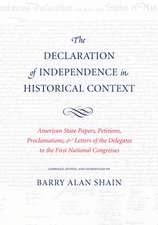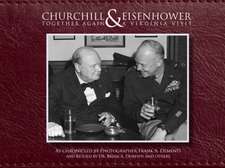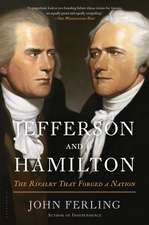The Gifted Generation: When Government Was Good
Autor David Goldfielden Limba Engleză Hardback – 10 ian 2018
Preț: 106.91 lei
Preț vechi: 132.90 lei
-20% Nou
Puncte Express: 160
Preț estimativ în valută:
20.46€ • 21.42$ • 16.93£
20.46€ • 21.42$ • 16.93£
Carte disponibilă
Livrare economică 15-29 martie
Preluare comenzi: 021 569.72.76
Specificații
ISBN-13: 9781620400883
ISBN-10: 162040088X
Pagini: 544
Ilustrații: 3 x 8 page B&W plate section and 4 B&W illustrations
Dimensiuni: 156 x 235 x 47 mm
Greutate: 0.95 kg
Editura: Bloomsbury Publishing
Colecția Bloomsbury USA
Locul publicării:New York, United States
ISBN-10: 162040088X
Pagini: 544
Ilustrații: 3 x 8 page B&W plate section and 4 B&W illustrations
Dimensiuni: 156 x 235 x 47 mm
Greutate: 0.95 kg
Editura: Bloomsbury Publishing
Colecția Bloomsbury USA
Locul publicării:New York, United States
Caracteristici
New
Catch
Phrase:"The
Gifted
Generation"
is
an
original
phrase,
coined
by
the
author.
It
separates
the
first
half
of
the
"Baby-Boomer
Generation"
(those
born
1945-1955,
"the
Gifted
Generation")
from
the
second
half
(those
born
1955-1965).
Those
in
the
Gifted
Generation
experienced
a
booming
economy,
an
expansion
of
civil
rights,
and
a
host
of
other
federally
championed
programs;
those
in
the
second
half
experienced
contraction,
retrenchment,
and
a
loss
of
faith
in
government.
The
"Baby
Boomer
Generation"
is
an
iconic
label
in
American
culture
and
this
revision
of
its
terms
will
be
a
big
draw
for
the
media
and
Boomer
readers.
Notă biografică
David
Goldfieldis
the
Robert
Lee
Bailey
Professor
of
History
at
the
University
of
North
Carolina,
Charlotte.
He
is
the
lead
author
of
the
cornerstone
textbookThe
American
Journey,
now
in
its
seventh
edition,
and
is
the
author
of
many
works
on
Southern
history,
includingStillFighting
the
Civil
War,Black,
White,
and
Southern,
and,
most
recently,America
Aflame.
He
lives
in
North
Carolina.
Recenzii
This
is
cheering
stuff,
a
reminder
that
America,
which
was
already
a
great
nation,
became
a
greater
nation
when
government
policies
were
able
to
help
release
the
potential
of
its
citizenry
.
.
.
Goldfield's
pages
are
filled
with
freshly
unearthed
nuggets.
A sweeping political and social history of America from the end of World War II to the present . . . [The Gifted Generation] recounts a phenomenon that many Americans have never experienced and don't believe is possible--a government that works . . . Goldfield tells the real story of how to make America great again.
An American history that serves as a heartfelt plea for a revival of socially responsible leadership.
Nicely wrought sketches of well- and lesser-known figures. The book's strengths are its measured tone, lively prose, and comprehensive coverage.
The Gifted Generationpowerfully shows that while we often think of the 1950s and 1960s as golden years of widespread prosperity, much of this economic leveling was achieved through federal policies and not the invisible hand of laissez-faire markets . . . Goldfield's survey of the Gifted Generation is comprehensive . . .
Goldfield argues compellingly that wise and dedicated politicians can use the power of the federal government to change and dramatically improve our society . . . This work reminds us that government action can be widely beneficial.
A comprehensive account of the 'gifted generation,' those born from 1940 through 1952. The author presents a compelling case that these early boomers were beneficiaries of an expansive government and an era of optimism, presided over by Presidents Harry Truman, Dwight Eisenhower, and Lyndon B. Johnson.
Goldfield is a skillful storyteller.
Activist government has been so demonized that we forget how much the federal government did to create the broad and prosperous middle class that led our nation to (yes) greatness after World War II. David Goldfield cures our amnesia with a sparkling, sweeping and deeply engaging account of an era 'when government was good' because so many Americans recognized the good that it did. MayThe Gifted Generationchange this generation's view of the progress that is possible.
The 'gifted generation' are the early baby boomers, born beginning in 1940-41 (he accurately dates the boom's start then, rather than the conventional 1946). Deftly weaving national-level policies and events with plain-folks vignettes, Goldfield shows how the gifted lived the 'commonwealth ideal,' the federal activism of FDR, Truman, Eisenhower, and LBJ--and how it declined into the 'Great Regression' of the past few decades. This is a fine new (and hopeful) history of postwar America.
A clearly argued, richly detailed, and provocative book. Goldfield suggests that the accomplishments of the so-called 'Greatest Generation' were due to the social supports they won in the aftermath of the Depression and WWII and then gifted to the next generation.
President Ronald Reagan famously insisted that 'government is not the solution to our problem; government is the problem.' David Goldfield's gracefully writtenThe Gifted Generationis a bracing reminder that the first three presidents after Franklin Roosevelt demonstrated in concrete ways that an activist government did have a critical and positive role to play in improving the lives of Americans, black and white, poor and middle class. Harry Truman, Dwight Eisenhower and Lyndon had their partisan differences, but they shared a belief in the 'Commonwealth' ideal: a government that strengthened individualism by promoting equal opportunities for all its citizens.
David Goldfield blends solid scholarship with eloquent writing to argue that dynamic federal leadership was last practiced by activist presidents, 1945-68. He deserves particular credit for recognizing Dwight Eisenhower's contribution, so shamefully neglected by historians. Goldfield skillfully reminds us that the continuing issue is not big or small government but 'good government.'
Riveting, often heartbreaking . . . [A] masterly synthesis of political, social, economic and religious history . . . Most history books try to explain the past. The exceptional ones, of whichAmerica Aflameis a distinguished example, remind us that the past is ultimately as inscrutable as the future.
A monumental new appraisal of the war.
Goldfield's narrative of the war proper is especially good, evoking the horror of the fighting and its impact on soldiers and civilians. The result is an ambitious, engrossing interpretation with new things to say about a much-studied conflagration.
Goldfield writes more as a novelist than an academic . . . A wonderful portrait of a nation scarred yet transformed.
A sweeping political and social history of America from the end of World War II to the present . . . [The Gifted Generation] recounts a phenomenon that many Americans have never experienced and don't believe is possible--a government that works . . . Goldfield tells the real story of how to make America great again.
An American history that serves as a heartfelt plea for a revival of socially responsible leadership.
Nicely wrought sketches of well- and lesser-known figures. The book's strengths are its measured tone, lively prose, and comprehensive coverage.
The Gifted Generationpowerfully shows that while we often think of the 1950s and 1960s as golden years of widespread prosperity, much of this economic leveling was achieved through federal policies and not the invisible hand of laissez-faire markets . . . Goldfield's survey of the Gifted Generation is comprehensive . . .
Goldfield argues compellingly that wise and dedicated politicians can use the power of the federal government to change and dramatically improve our society . . . This work reminds us that government action can be widely beneficial.
A comprehensive account of the 'gifted generation,' those born from 1940 through 1952. The author presents a compelling case that these early boomers were beneficiaries of an expansive government and an era of optimism, presided over by Presidents Harry Truman, Dwight Eisenhower, and Lyndon B. Johnson.
Goldfield is a skillful storyteller.
Activist government has been so demonized that we forget how much the federal government did to create the broad and prosperous middle class that led our nation to (yes) greatness after World War II. David Goldfield cures our amnesia with a sparkling, sweeping and deeply engaging account of an era 'when government was good' because so many Americans recognized the good that it did. MayThe Gifted Generationchange this generation's view of the progress that is possible.
The 'gifted generation' are the early baby boomers, born beginning in 1940-41 (he accurately dates the boom's start then, rather than the conventional 1946). Deftly weaving national-level policies and events with plain-folks vignettes, Goldfield shows how the gifted lived the 'commonwealth ideal,' the federal activism of FDR, Truman, Eisenhower, and LBJ--and how it declined into the 'Great Regression' of the past few decades. This is a fine new (and hopeful) history of postwar America.
A clearly argued, richly detailed, and provocative book. Goldfield suggests that the accomplishments of the so-called 'Greatest Generation' were due to the social supports they won in the aftermath of the Depression and WWII and then gifted to the next generation.
President Ronald Reagan famously insisted that 'government is not the solution to our problem; government is the problem.' David Goldfield's gracefully writtenThe Gifted Generationis a bracing reminder that the first three presidents after Franklin Roosevelt demonstrated in concrete ways that an activist government did have a critical and positive role to play in improving the lives of Americans, black and white, poor and middle class. Harry Truman, Dwight Eisenhower and Lyndon had their partisan differences, but they shared a belief in the 'Commonwealth' ideal: a government that strengthened individualism by promoting equal opportunities for all its citizens.
David Goldfield blends solid scholarship with eloquent writing to argue that dynamic federal leadership was last practiced by activist presidents, 1945-68. He deserves particular credit for recognizing Dwight Eisenhower's contribution, so shamefully neglected by historians. Goldfield skillfully reminds us that the continuing issue is not big or small government but 'good government.'
Riveting, often heartbreaking . . . [A] masterly synthesis of political, social, economic and religious history . . . Most history books try to explain the past. The exceptional ones, of whichAmerica Aflameis a distinguished example, remind us that the past is ultimately as inscrutable as the future.
A monumental new appraisal of the war.
Goldfield's narrative of the war proper is especially good, evoking the horror of the fighting and its impact on soldiers and civilians. The result is an ambitious, engrossing interpretation with new things to say about a much-studied conflagration.
Goldfield writes more as a novelist than an academic . . . A wonderful portrait of a nation scarred yet transformed.







